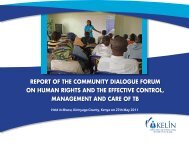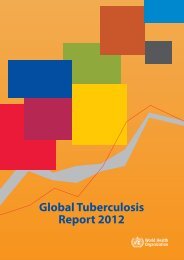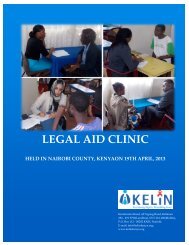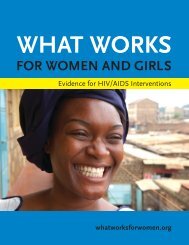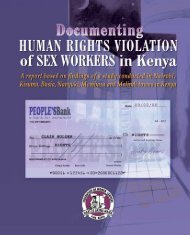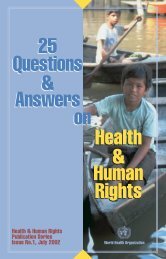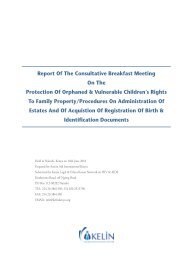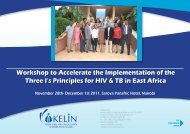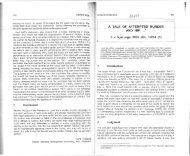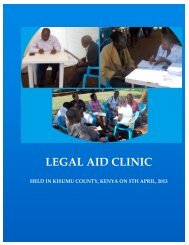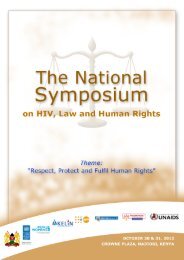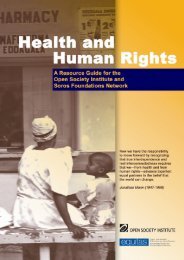tsc sub sector hiv-aids workplace policy - HIV/AIDS Clearinghouse
tsc sub sector hiv-aids workplace policy - HIV/AIDS Clearinghouse
tsc sub sector hiv-aids workplace policy - HIV/AIDS Clearinghouse
Create successful ePaper yourself
Turn your PDF publications into a flip-book with our unique Google optimized e-Paper software.
TEACHERS SERVICE COMMISSION<br />
SUB-SECTOR WORKPLACE POLICY<br />
ON<br />
<strong>HIV</strong> AND <strong>AIDS</strong>
TABLE OF CONTENTS<br />
PAGE<br />
Preface<br />
iii<br />
Foreword<br />
v<br />
Glossary of Terms Concepts<br />
vii<br />
Acronyms and Abbreviations<br />
x<br />
1.0 Introduction 1<br />
2.0 Rationale 2<br />
3.0 Policy Statement 3<br />
4.0 Objectives 4<br />
5.0 Scope 5<br />
6.0 Legal and Regulatory Framework 5<br />
7.0 Principles 8<br />
8.0 Management of Human Resource 11<br />
9.0 <strong>HIV</strong> and <strong>AIDS</strong> Programmes in the Workplace 18<br />
10.0 Implementation 20<br />
11.0 Monitoring, Evaluation and Research 24<br />
12.0 Policy Review And Development 24<br />
Appendices<br />
Annex 1 Institutional Framework for TSC <strong>sub</strong>-Sector Policy inclusive of External Partners 25<br />
Annex 2 Institutional Framework for TSC <strong>sub</strong>-Sector Policy within the Commission 26<br />
Annex 3 Roles and Responsibilities of External Partners 27<br />
Annex 4. Minimum Internal Requirements 29<br />
ii
PREFACE<br />
The development of this <strong>policy</strong> has been necessitated by the challenges posed by <strong>HIV</strong> and <strong>AIDS</strong> in the<br />
<strong>workplace</strong>. <strong>HIV</strong> and <strong>AIDS</strong> has affected the teachers and secretariat staff in their prime age. The illness<br />
and <strong>sub</strong>sequent deaths of Commission employees resulting from <strong>HIV</strong> and <strong>AIDS</strong> has enormous impact<br />
on the performance and production. A lot of working hours are diverted to treatment, care and support<br />
for <strong>HIV</strong> and <strong>AIDS</strong> related illness leading to erosion of resources and underachievement.<br />
The Teachers Service Commission as a response to these challenges initially established the <strong>sub</strong>-ACU<br />
in September 2000 which was later upgraded to a full fledged ACU in March 2004. This was in line with<br />
the Government’s position of having declared the pandemic a National Disaster in 1999. The<br />
Government had already put in place a national <strong>policy</strong>, defined an institutional framework and intensified<br />
intervention measures for the prevention, management, control and mitigation of <strong>HIV</strong> and <strong>AIDS</strong> impact.<br />
As was in the whole Public Sector, the Teachers Service Commission has been carrying out <strong>HIV</strong> and<br />
<strong>AIDS</strong> intervention programmes but without a comprehensive <strong>workplace</strong> <strong>policy</strong> to guide, strengthen and<br />
co-ordinate these programmes.<br />
This <strong>sub</strong>-<strong>sector</strong> <strong>policy</strong> has harmonized the approach to various Human Resource issues and takes<br />
cognizance of the fundamental issues that come from the attrition of the Human Resource in the<br />
teaching <strong>sub</strong>- <strong>sector</strong>. The <strong>policy</strong> also recognises that addressing stigma and discrimination is a critical<br />
element in combating <strong>HIV</strong> and <strong>AIDS</strong> pandemic in the <strong>workplace</strong>. The <strong>policy</strong> emphasizes the need for<br />
<strong>HIV</strong> and <strong>AIDS</strong> activities to be mainstreamed in the core activities of the Teachers Service Commission.<br />
To achieve this, there is need for strong leadership, sustained commitment and adequate allocation of<br />
budgetary resources for <strong>HIV</strong> and <strong>AIDS</strong> programmes.<br />
The <strong>policy</strong> provides guidance for those who deal with the day-to-day <strong>HIV</strong> and <strong>AIDS</strong> related issues and<br />
problems that arise within the <strong>workplace</strong> and also outlines employees rights, responsibilities and<br />
expected behaviour in the <strong>workplace</strong>. The strategies outlined in this <strong>policy</strong> aim at minimizing the effects<br />
of the pandemic in the Commission and providing the means towards efficiency in service delivery.<br />
The <strong>policy</strong>’s emphasis is on performance improvement as teachers and secretariat staff will be healthier<br />
and live longer regardless of their <strong>HIV</strong> status once properly managed.<br />
The implementation of this <strong>policy</strong> will go along way in mitigating the impact of the pandemic in Teachers<br />
Service Commission.<br />
IBRAHIM HUSSEIN, EBS, HSC.<br />
COMMISSION CHAIRMAN<br />
TEACHERS SERVICE COMMISSION<br />
iii
FOREWORD<br />
Education has a key role to play both in preventing <strong>HIV</strong> and <strong>AIDS</strong> and in mitigating its effects on<br />
individuals, families, communities and society. <strong>HIV</strong> and <strong>AIDS</strong> has affected the most productive and<br />
energetic group of 20-49 years where the levels of infection peak and this population includes the<br />
Teachers Service Commission employees- teachers as well as secretariat staff.<br />
The Dakar Framework for Action for “Education for All” (EFA), adopted by the international education<br />
community during the World Education Forum (Dakar, Senegal – April 2000), draws attention to the<br />
urgent need to combat <strong>HIV</strong> and <strong>AIDS</strong> if EFA goals are to be achieved. Gains made by Governments in<br />
terms of access, quality and retention is seriously threatened by the <strong>HIV</strong>/<strong>AIDS</strong> epidemic and its impact<br />
on the demand for, and supply of, education. EFA goals and the Millennium Development Goal for<br />
Education cannot be achieved without urgent attention to <strong>HIV</strong> and <strong>AIDS</strong>.<br />
In Kenya, the <strong>HIV</strong> and <strong>AIDS</strong> pandemic is a major national challenge and in 1999 it was declared a<br />
national disaster. The pandemic impacts adversely on the education <strong>sector</strong> as a whole and it affects<br />
quality, access, equity, supply and demand for education services.<br />
At present there is no cure or vaccine for <strong>HIV</strong> and <strong>AIDS</strong> and the only way to stop its spread is through<br />
attitudinal and behavioural changes as well as management that can be secured effectively through<br />
education.<br />
For the Teachers Service Commission to respond effectively to the challenges of this pandemic there is<br />
need to develop a <strong>policy</strong> for addressing <strong>HIV</strong> and <strong>AIDS</strong> issues as they affect the entire education and<br />
teacher provisioning system.<br />
The Teachers Service Commission <strong>policy</strong> on <strong>HIV</strong> and <strong>AIDS</strong> formalizes the rights and responsibilities of<br />
every person involved, directly or indirectly, with regard to <strong>HIV</strong> and <strong>AIDS</strong>.<br />
G.K. LENGOIBONI<br />
COMMISSION SECRETARY/CHIEF EXECUTIVE<br />
TEACHERS SERVICE COMMISSION<br />
iv
GLOSSARY OF TERMS AND CONCEPTS<br />
Affected<br />
<strong>AIDS</strong><br />
Care<br />
Comprehensive<br />
Counselling<br />
Confidentiality<br />
Evaluation<br />
<strong>HIV</strong><br />
<strong>HIV</strong> Screening<br />
Infected<br />
Manager<br />
Monitoring<br />
Pandemic<br />
Policy<br />
Post Exposure<br />
Prevalence of <strong>HIV</strong><br />
Prevention<br />
A person who is feeling the impact of <strong>HIV</strong>/<strong>AIDS</strong> through sickness or loss of<br />
relatives, friends or colleagues.<br />
Acquired Immune Deficiency Syndrome: a cluster of medical conditions often<br />
referred to as opportunistic infections.<br />
Promotion of a person’s well being through medical, physical, psychosocial,<br />
spiritual and other means.<br />
A range of services offered to <strong>HIV</strong> positive persons including treatment, clinical,<br />
physical, nutritional and psychosocial support.<br />
A session where a person with difficulties is assisted to think through the<br />
problem and find a possible solution<br />
The right of every person, employee or job applicant to have his/her medical or<br />
other information, including <strong>HIV</strong> status kept secret.<br />
The assessment of the impact of a programme of a particular point in time.<br />
Human Immunodeficiency Virus: a virus that weakens the body’s immune<br />
system, ultimately causing <strong>AIDS</strong>.<br />
A medical test to determine a person’s sero- status<br />
A person who is living with the virus that causes <strong>AIDS</strong><br />
A person who is in charge of staff and other resources.<br />
Continuous assessment of a programme<br />
An epidemic occurring simultaneously over a wide area and affecting many<br />
people.<br />
A statement setting out a department’s or organization’s position on a particular<br />
issue.<br />
Immediate treatment given to a person who is Prophylaxis presumed to have<br />
been exposed to <strong>HIV</strong>.<br />
The number of people with <strong>HIV</strong> at a particular point in time, often expressed as<br />
a percentage of the total population.<br />
A programme designed to combat <strong>HIV</strong> infection and transmission.<br />
v
Support<br />
Treatment<br />
VCT<br />
Workplace<br />
Programme<br />
Services and assistance that are provided to help a person cope with difficult<br />
situations and challenges.<br />
A medical term describing the steps taken to manage an illness.<br />
Voluntary counselling and Testing: A process that enables people to willingly<br />
know their sero-status to help them plan their lives and make informed<br />
decisions.<br />
Occupational settings, stations and places where workers spend time for<br />
gainful employment.<br />
An intervention to address a specific issue within the <strong>workplace</strong>.<br />
vi
ACRONYMS AND ABBREVIATIONS<br />
ACU<br />
<strong>AIDS</strong><br />
CE<br />
CS<br />
HAPC<br />
<strong>HIV</strong><br />
HOD<br />
IEC<br />
ILO<br />
MIR<br />
MTEF<br />
NACC<br />
PEP<br />
PLWHA<br />
STIs<br />
Sub-ACUs<br />
TSC<br />
VCT<br />
PS/DPM<br />
<strong>AIDS</strong> Control Unit<br />
Acquired Immune Deficiency Syndrome<br />
Chief Executive<br />
Commission Secretary<br />
<strong>HIV</strong> and <strong>AIDS</strong> Prevention and Control<br />
Human Immunodeficiency Virus<br />
Head of Department<br />
Information, Education and Communication<br />
International Labour Organization<br />
Minimum Internal Requirements<br />
Medium Term Expenditure Framework<br />
National <strong>AIDS</strong> Control Council<br />
Post Exposure Prophylaxis<br />
People Living with <strong>HIV</strong> and <strong>AIDS</strong><br />
Sexually Transmitted Infections<br />
Sub-<strong>AIDS</strong> Control Units<br />
Teachers Service Commission<br />
Voluntary Counselling and Testing<br />
Permanent Secretary/Directorate Personnel<br />
Management<br />
vii
1.0 INTRODUCTION<br />
The <strong>HIV</strong> and <strong>AIDS</strong> is now a global crisis and constitutes one of the most formidable challenges to<br />
development and social progress. It is eroding decades of development gains, undermining economies,<br />
threatening security and destabilizing societies.<br />
<strong>HIV</strong> and <strong>AIDS</strong> profoundly disrupt the economic and social basis of families. It mainly affects people in<br />
their prime years of life, the hardest hit being those in the productive ages of between 20 and 49 years.<br />
It is also affecting fundamental rights at the <strong>workplace</strong>, particularly with respect to discrimination and<br />
stigmatization of people living with and affected by <strong>HIV</strong> and <strong>AIDS</strong>.<br />
As a response to this calamity, the Government adopted a multi-<strong>sector</strong>al strategy and declared the<br />
pandemic a national disaster. Through the sessional Paper No.4 of 1997 on <strong>AIDS</strong> in Kenya, the<br />
Government put in place a national <strong>policy</strong> and defined an institutional framework and intensified<br />
intervention measures for the prevention, management, control and mitigation of impact of <strong>HIV</strong> and<br />
<strong>AIDS</strong>. The National <strong>AIDS</strong> Council Control (NACC) within this framework is charged with the<br />
responsibility of resource mobilization, <strong>policy</strong> development and co-ordination of multi<strong>sector</strong>al <strong>HIV</strong> and<br />
<strong>AIDS</strong> response campaign. In addition, the Government has established a Cabinet Committee on<br />
National Campaign against <strong>HIV</strong> and <strong>AIDS</strong> under the Chairmanship of His Excellency the President.<br />
The Teachers Service Commission workforce has not been spared by the <strong>HIV</strong>/<strong>AIDS</strong> pandemic and in<br />
response the Commission has developed a <strong>policy</strong> to address this crisis. The <strong>sub</strong>-<strong>sector</strong> <strong>policy</strong> aims at<br />
providing guidance to the management of employees who are infected and affected by <strong>HIV</strong> and <strong>AIDS</strong><br />
and prevention of further infections. The <strong>sub</strong>-<strong>sector</strong> <strong>policy</strong> also defines the TSC’s position and practices<br />
within the multi<strong>sector</strong>al response to <strong>HIV</strong> and <strong>AIDS</strong> pandemic. In addition, it provides guidance for those<br />
who deal with the day-to-day <strong>HIV</strong> and <strong>AIDS</strong> related issues and problems that arise within the TSC<br />
<strong>workplace</strong> and outlines employee’s rights, responsibilities and expected behaviour in the <strong>workplace</strong>.<br />
The <strong>sub</strong>-<strong>sector</strong> <strong>policy</strong> covers key areas such as legal and regulatory framework, guiding principles,<br />
management of human resource, <strong>HIV</strong> and <strong>AIDS</strong> programmes in the <strong>workplace</strong> and their<br />
implementation.<br />
2.0 RATIONALE<br />
<strong>HIV</strong> and <strong>AIDS</strong> presents the greatest challenge to service provision in the Commission and has put<br />
immense pressure in the <strong>workplace</strong>. It has led to loss of skilled and experienced manpower due to<br />
deaths, loss of man hours due to prolonged illness, absenteeism, reduced performance, increased<br />
stress, stigma, discrimination and loss of institutional memories, among others. Consequently, there is<br />
a decrease in productivity and an increase in health care costs for both the employer and employees.<br />
As a result of the negative impact of <strong>HIV</strong> and <strong>AIDS</strong> in the <strong>workplace</strong>, the Teachers Service Commission<br />
as an employer has the challenge to provide a <strong>sub</strong> <strong>sector</strong> <strong>policy</strong> framework for the prevention,<br />
treatment, care and support of the infected and affected employees.<br />
It has been found necessary to develop a clear, consistent, coherent and harmonized <strong>policy</strong> framework<br />
on <strong>HIV</strong> and <strong>AIDS</strong> in line with the Public Sector and Education Sector policies on <strong>HIV</strong> and <strong>AIDS</strong>. This<br />
1
<strong>sub</strong>-<strong>sector</strong> <strong>policy</strong> demonstrates the Teachers Service Commission’s concern and commitment in taking<br />
concrete steps in the management of <strong>HIV</strong> and <strong>AIDS</strong> pandemic but also provides guidance on the<br />
development of <strong>workplace</strong> guidelines.<br />
3.0 POLICY STATEMENT<br />
<strong>HIV</strong>/<strong>AIDS</strong> pandemic is a national disaster and is impacting greatly on the Teachers Service Commission<br />
in terms of performance and loss of personnel. The scourge therefore, requires a multi-dimensional<br />
attack and hence the commission shall endeavour to put in place all possible measure geared towards<br />
containing the spread and effect of the disease at the <strong>workplace</strong>.<br />
The Commission shall give the necessary care and support for people living with <strong>HIV</strong>/<strong>AIDS</strong> among its<br />
employees by providing the necessary structures and programmes aimed at ensuring nondiscrimination<br />
and distigmatization of the infected and affected employees.<br />
The Commission is committed in taking bold steps in the management of <strong>HIV</strong>/<strong>AIDS</strong> pandemic as well as<br />
providing guidance on how to handle those infected and affected. To achieve this the Commission shall<br />
establish Minimum Internal Requirements (MIR) for its employees (infected and affected) and<br />
endeavour to ensure that all employees enjoy working productively irrespective of their status in a nondiscriminatory<br />
environment.<br />
4.0 OBJECTIVES<br />
The main objective of this <strong>policy</strong> is to provide a framework to address <strong>HIV</strong> and <strong>AIDS</strong> in the <strong>workplace</strong>.<br />
Specifically, the <strong>policy</strong> aims to:<br />
Set Minimum Internal Requirements (MIR) for managing <strong>HIV</strong> and <strong>AIDS</strong> in the <strong>workplace</strong>;<br />
<br />
<br />
<br />
<br />
<br />
Establish structures and promoting programmes to ensure non-discrimination and nonstigmatization<br />
of the infected and affected;<br />
Establish Monitoring and Evaluation of <strong>HIV</strong> and <strong>AIDS</strong> Programmes and activities at the<br />
<strong>workplace</strong>s;<br />
Contribute to national efforts to minimizing the spread and mitigating against the impact of<br />
<strong>HIV</strong>/<strong>AIDS</strong>;<br />
Guide managers and employees on their rights and obligations regarding <strong>HIV</strong> and <strong>AIDS</strong>; and<br />
Provide a framework for development of <strong>workplace</strong> guidelines.<br />
5.0 SCOPE<br />
This <strong>sub</strong>-<strong>sector</strong> <strong>policy</strong> sets standards for managing <strong>HIV</strong> and <strong>AIDS</strong> for <strong>workplace</strong> programmes. It applies<br />
to all TSC employees-who include <strong>policy</strong> makers, secretariat staff and all teachers but excludes<br />
university staff.<br />
2
6.0 LEGAL AND REGULATORY FRAMEWORK<br />
Kenya has a number of statutes for responding to <strong>HIV</strong> and <strong>AIDS</strong> related issues in the <strong>workplace</strong> though<br />
the current acts do not specifically refer to <strong>HIV</strong> and <strong>AIDS</strong>. However, it is recognized that an enabling<br />
legal and regulatory environment is imperative to create the desired impact in the fight against <strong>HIV</strong> and<br />
<strong>AIDS</strong> pandemic. In this regard, the Government is committed to continue with legislative reforms, which<br />
are responsive to the needs of <strong>HIV</strong>, and <strong>AIDS</strong> infected and affected persons. This is in line with<br />
international obligations including the International Labour Organization (ILO) Code of Practice on <strong>HIV</strong><br />
and <strong>AIDS</strong> and World of Work (2001). The public <strong>sector</strong> <strong>policy</strong> and all <strong>sub</strong>-<strong>sector</strong> policies shall be<br />
implemented within the framework of the Constitution of Kenya and other legislation in place as well as<br />
proposed legislation which includes the following:<br />
6.1 The Constitution of Kenya<br />
The Constitution of the Republic of Kenya is the supreme law of Kenya and all other laws must comply<br />
with it. The fundamental rights in the constitution provide every person with the right to equality and<br />
non- discrimination.<br />
6.2 Service Commissions Act Cap 185 (1985 Revised)<br />
The Act prohibits discrimination in appointment promotion and transfer. In particular, the Act provides in<br />
regulation 13 of the Public Service Commission (PSC) regulations that, the appointment, promotion and<br />
transfer of a public officer shall take into account only the merit, ability, seniority, experience and official<br />
qualifications of the candidate.<br />
Under regulation 19, the Act provides that if a public officer is incapable by reason of any infirmity of<br />
mind or body of discharging the functions of his public office he/she may present himself/herself before<br />
a Medical Board with a view to it being ascertained whether or not he/she is incapable as aforesaid.<br />
Any employee who is ill shall seek and obtain permission from the relevant authority for absence from<br />
the <strong>workplace</strong> on account of the ill health. Absence from duty without permission is actionable in<br />
accordance with Service Regulations.<br />
Further under part IV of the PSC Regulations, an officer must be informed and given a chance to<br />
respond and appeal to the Public Service Commission of Kenya in accordance with the provisions laid<br />
down in the Regulation in respect of disciplinary proceedings or any termination of employment. No<br />
punishment shall be inflicted on any public officer, which would be contrary to any law.<br />
6.3 The Employment Act Cap.226<br />
The Employment Act sets out the minimum standards applicable for conditions of employment relating<br />
to wages, leave, health and contracts of service including termination of the contract.<br />
Under the Act, the employer shall provide proper healthcare for his employees during serious illness.<br />
The employer can only discharge this function if the employee notifies the employer of the illness.<br />
3
The Act implies that there shall be no discrimination on the grounds of <strong>HIV</strong> and <strong>AIDS</strong> status.<br />
6.4 Factories and Other Places of Work Act Cap.514<br />
The Government is in the process of repealing the Factories and Other Places of Work Act. Cap 514<br />
with a view to enact a new law which will provide for safety, health and welfare of persons employed<br />
and all persons lawfully present at <strong>workplace</strong>s and for matters incidental thereto and connected<br />
therewith purposes.<br />
The Act requires of the employer, as far as it is reasonably practicable, to create a safe working<br />
environment for the employees. The implication of the Act regarding <strong>HIV</strong> is that the employer needs to<br />
ensure that the risk of possible infection in the <strong>workplace</strong> is minimized.<br />
6.5 The TSC Act Cap 212, Codes of Regulations and Code of Conduct and Ethics<br />
These provisions cover TSC employees as also specified in the TSC Act Cap 212 and Codes of<br />
Regulations and the Code of Conduct and Ethics.<br />
7.0 PRINCIPLES<br />
The Principles that guide this <strong>sub</strong>-<strong>sector</strong> <strong>policy</strong> are in accordance with international conventions,<br />
national laws, policies, guidelines and regulations. These principles are:<br />
7.1 Recognition of <strong>HIV</strong> and <strong>AIDS</strong> as a <strong>workplace</strong> issue<br />
<strong>HIV</strong> and <strong>AIDS</strong> is a <strong>workplace</strong> issue and shall be treated like any other serious illness/condition in the<br />
<strong>workplace</strong>. This is necessary not only because it affects the workforce, but also the <strong>workplace</strong> being<br />
part of the local community, has a role to play in the wider struggle to limit effects of the pandemic.<br />
7.2 Non-Discrimination<br />
There shall be no discrimination and/or stigmatization of employees on the basis of real or perceived<br />
<strong>HIV</strong> status. Discrimination and stigmatization of the infected inhibits efforts aimed at promoting <strong>HIV</strong><br />
prevention.<br />
7.3 Gender Equality<br />
Gender dimensions of <strong>HIV</strong> and <strong>AIDS</strong> shall be recognized. Women are most likely to become infected<br />
and are more often adversely affected by the <strong>HIV</strong> and <strong>AIDS</strong> pandemic than men due to biological,<br />
social-cultural and economic reasons. The greater the gender discrimination in societies and the lower<br />
position of women, the more negatively they are affected by <strong>HIV</strong>. Therefore, equal gender relations and<br />
the empowerment of women are vital to successful prevention of the spread of <strong>HIV</strong> infection and enable<br />
women to cope with <strong>HIV</strong> and <strong>AIDS</strong>.<br />
7.4 Safe and Healthy Work Environment<br />
The work environment shall be healthy and safe and adapted to the state of health and capabilities of<br />
workers. All managers have a responsibility to minimize the risk of <strong>HIV</strong> transmission by taking the<br />
appropriate First Aid/Universal infection control precautions at the <strong>workplace</strong>.<br />
4
7.5 Social Dialogue<br />
A successful <strong>HIV</strong> and <strong>AIDS</strong> <strong>policy</strong> requires co-operation, willingness and trust amongst the employer,<br />
employees and stakeholders through dialogue.<br />
7.6 Screening for purpose of Employment<br />
<strong>HIV</strong> and <strong>AIDS</strong> screening shall not be required of job applicants or persons in employment and testing for<br />
<strong>HIV</strong> shall not be carried out at the <strong>workplace</strong> except as specified in the National <strong>HIV</strong> and <strong>AIDS</strong> <strong>policy</strong> on<br />
testing.<br />
7.7 Confidentiality<br />
Access to personal data relating to a worker’s <strong>HIV</strong> status shall be bound by the rules of confidentiality<br />
consistent with existing ILO code of practice and medical ethics.<br />
7.8 Continuation of Employment Relationship<br />
<strong>HIV</strong> infection is not a cause for termination of employment. Employees with <strong>HIV</strong> related illnesses will be<br />
allowed to work for as long as medically fit in available appropriate work.<br />
7.9 Prevention<br />
<strong>HIV</strong> infection is preventable. Prevention of all means of transmission can be achieved through behaviour<br />
change, knowledge, treatment, and the creation of non-discriminatory environment. Social partners are<br />
in a unique position to promote prevention effort, particularly in relation to changing attitudes, through<br />
the provision of information and education and in addressing socio-economic factors.<br />
7.10 Care, Treatment and Support<br />
All infected and affected employees have the right to access holistic care, treatment and support in line<br />
with available resources. The TSC shall work in partnership with agencies offering support and care<br />
including institutions, communities, private and public health care systems.<br />
7.11 Management Responsibility<br />
The TSC shall ensure the highest level of leadership as part of the campaign against <strong>HIV</strong> and <strong>AIDS</strong>.<br />
7.12 Partnerships<br />
The TSC shall be responsible and accountable for the implementation of this <strong>sub</strong>-<strong>sector</strong> <strong>policy</strong>. It will at<br />
all times seek to develop effective partnerships to enhance the success of the <strong>sub</strong>-<strong>sector</strong> <strong>policy</strong><br />
implementation.<br />
7.13 Fair Labour Practices<br />
Every employee whether infected or affected has the right to fair labour practices in terms of<br />
registration, recruitment, appointment and continued enjoyment of employment, promotion, training and<br />
benefits. <strong>HIV</strong> testing as a requirement for any of the above is prohibited<br />
5
7.14 Workplace ethics<br />
There shall be zero tolerance to sexual harassment, abuse and exploitation.<br />
7.15 Greater involvement of People Living With <strong>HIV</strong> and <strong>AIDS</strong> (PLWHA)<br />
The involvement of PLWHA in educating and informing other employees shall be promoted at all<br />
<strong>workplace</strong>s of the TSC.<br />
8.0 MANAGEMENT OF HUMAN RESOURCE<br />
The Human Resource is the most important factor of production in any organization as it controls all the<br />
others. Success or failure of an organization depends largely on the Human resource and there is<br />
therefore need to examine the issues that affect it. According to ILO, <strong>HIV</strong> and <strong>AIDS</strong> is a major threat to<br />
the world of work because it affects the most productive segment of the labour force. It is imposing<br />
huge costs on enterprises in all <strong>sector</strong>s through declining productivity and earnings, increasing labour<br />
costs and loss of skills and experience. It has led to high staff turnover, high costs in training and<br />
replacement, high health care and employee welfare costs including funeral expenses.<br />
In this regard, managers in the TSC have a particularly important role to play in its response to <strong>HIV</strong> and<br />
<strong>AIDS</strong>. It is their responsibility to address the problems caused by <strong>HIV</strong> and <strong>AIDS</strong> in the <strong>workplace</strong> at<br />
both institutional and individual levels. The dichotomy between institutional requirements and those of<br />
individuals living with or affected by <strong>HIV</strong> and <strong>AIDS</strong> makes this a challenging task.<br />
This <strong>sub</strong>-<strong>sector</strong> <strong>policy</strong> is the starting point for the management of <strong>HIV</strong> and <strong>AIDS</strong> in the <strong>workplace</strong> as it<br />
establishes a coherent approach in addressing the issues associated with the pandemic. It provides<br />
consistency in dealings with its employees through the programmes, procedures and rules that flow<br />
from the <strong>policy</strong>.<br />
This <strong>sub</strong>-<strong>sector</strong> <strong>policy</strong> addresses the following human resource management issues:<br />
8.1 Recruitment and Promotion<br />
<strong>HIV</strong> screening shall not be a requirement for staff recruitment, and /or promotion.<br />
8.2 Sick leave<br />
Sick leave shall be provided for as stipulated in the TSC Codes of Regulations. However, any additional<br />
sick leave days will be decided on case-by-case basis at the discretion of Commission.<br />
8.3 Working hours<br />
Normal working hours shall continue to apply for all TSC employees. However, a more flexible<br />
approach may be applied for those who are infected or affected.<br />
8.4 Counselling services<br />
The TSC shall ensure that each of its <strong>workplace</strong>s has a pool of skilled counselors trained from among<br />
the staff to provide counselling and referral services.<br />
6
8.5 Termination of Employment<br />
The policies and procedures pertaining to termination of services shall apply to all employees. No<br />
employee shall be dismissed or have employment terminated based solely on perceived or actual <strong>HIV</strong><br />
status.<br />
8.6 Medical Privileges<br />
The normal provision of medical privileges shall continue to apply. However, to reduce the negative<br />
effects of illness and incapacity on employees, the TSC shall advocate to the Government to take steps<br />
to improve access to comprehensive care.<br />
8.7 Deployment and Transfers<br />
The TSC shall from time to time review current policies, codes and deployment and transfer practices of<br />
employees. In particular, the Commission shall ensure that:<br />
<br />
<br />
<br />
<br />
Where possible, partners and spouses are not separated to minimize vulnerability;<br />
Where employees are deployed in remote areas, the period served in such areas is limited<br />
to five (5) years.<br />
Where possible, staff requiring access to family support or medical care are deployed<br />
appropriately; and<br />
Where fitness to work is impaired by illness, reasonable alternative working arrangements<br />
may be made.<br />
8.8 Relief Services<br />
The Commission shall advocate for adequate resources from the Government for relief workforce to<br />
offer relief services. Where an employee is temporarily unable to perform their duties, reasonable<br />
alternatives through employee relief services may be made.<br />
8.9 Training and Development<br />
The TSC shall:<br />
Educate and train all its employees on <strong>HIV</strong> and <strong>AIDS</strong> related issues;<br />
<br />
<br />
<br />
Monitor and evaluate human resource so that there is adequate supply of appropriately skilled<br />
manpower to meet the needs for service delivery;<br />
Mainstream <strong>HIV</strong> and <strong>AIDS</strong> in all its <strong>workplace</strong>s and undertake regular updates to respond to the<br />
dynamics of <strong>HIV</strong> and <strong>AIDS</strong>; and<br />
Ensure there is appropriate recognition of <strong>HIV</strong> and <strong>AIDS</strong> related training and development of<br />
career paths that encourage staff to work and remain in <strong>HIV</strong> and <strong>AIDS</strong> related fields.<br />
7
8.10 Sexual Harassment, Abuse and exploitation<br />
There shall be zero tolerance to sexual harassment, abuse and exploitation in the <strong>workplace</strong>.<br />
Involvement in these vices shall be treated as gross misconduct and where proven, shall lead to<br />
disciplinary action.<br />
8.11 Gender Responsiveness<br />
<strong>HIV</strong> and <strong>AIDS</strong> affects and impacts on women and men differently due to their biological, social, cultural<br />
and economic circumstances. Application of this <strong>sub</strong>-<strong>sector</strong> <strong>policy</strong> shall be responsive to their different<br />
needs.<br />
8.12 Exposure at the Workplace<br />
<br />
Employees who accidentally get exposed to <strong>HIV</strong> in the course of their duties shall be entitled to<br />
immediate Post-Exposure Prophylaxis (PEP) and follow up in the form of treatment in case of<br />
infection.<br />
Provision shall be made to ensure safety and absence of risk to health, arising from the use,<br />
handling, storage and transport of articles and <strong>sub</strong>stances.<br />
8.13 Retirement on Medical Grounds<br />
<strong>HIV</strong> and <strong>AIDS</strong> is not a cause for termination of employment. As with many other illnesses, persons with<br />
<strong>HIV</strong> related illnesses should be able to work as long as medically fit for available appropriate work, or<br />
until declared unfit to work by a Medical Board. Where an employee is medically unfit to continue<br />
working, the Commission will hasten the retirement process.<br />
8.14 Terminal Benefits<br />
Whenever an employee retires or dies due to <strong>HIV</strong> and <strong>AIDS</strong> or other reasons, the Commission will<br />
facilitate speedy processing of terminal benefits. Accordingly, it will be necessary for both the employer<br />
and employees to ensure that the next of kin records are updated regularly.<br />
8.15 Confidentiality and Disclosure<br />
<br />
<br />
Disciplinary action, consistent with relevant legislation and regulations, will be taken against any<br />
employee who discloses a fellow employee’s <strong>HIV</strong> sero status without consent.<br />
Creating a climate of openness about <strong>HIV</strong> and <strong>AIDS</strong> is an effective prevention and care<br />
strategy. The Commission shall create a working environment in which employees can feel safe<br />
to disclose their <strong>HIV</strong> status.<br />
8.16 Discrimination and Stigma<br />
<br />
<br />
All employees have the same rights and obligations as stipulated in the terms and conditions of<br />
service.<br />
No employee or job applicant shall be discriminated against in access to or continued<br />
employment, training, promotion and employee benefits on the basis of their actual or perceived<br />
<strong>HIV</strong> status.<br />
8
Employees shall not refuse to work or interact with fellow colleagues on the grounds that the<br />
latter are infected or perceived to be infected. Such refusal shall constitute misconduct.<br />
8.17 Grievances and Concerns<br />
The Chief Executive shall establish and maintain communication channels for employees to raise<br />
concerns and grievances and access support relating to <strong>HIV</strong> and <strong>AIDS</strong>.<br />
8.18 Management Responsibility<br />
A manager has an obligation and a responsibility to:<br />
Show leadership as part of the Commission’s campaign to address the pandemic;<br />
<br />
<br />
<br />
Be educated and informed about the pandemic including developments in respect of<br />
prevention and treatment;<br />
Implement this <strong>sub</strong>-<strong>sector</strong> <strong>policy</strong>, as well as to continuously disseminate information about <strong>HIV</strong><br />
and <strong>AIDS</strong> to all employees; and<br />
Include <strong>HIV</strong> and <strong>AIDS</strong> <strong>workplace</strong> issues in the Commission’s strategic plan.<br />
8.19 Employee Responsibility<br />
<br />
<br />
<br />
It is the responsibility of an employee to take appropriate action on being informed about <strong>HIV</strong><br />
and <strong>AIDS</strong>, to protect him/herself and the family and seek guidance and counselling.<br />
All employees must comply with the <strong>HIV</strong> and <strong>AIDS</strong> <strong>sub</strong>-<strong>sector</strong> <strong>workplace</strong> <strong>policy</strong>. In addition, all<br />
employees are expected to attend, lend support to and participate in all activities aimed at<br />
combating <strong>HIV</strong> and <strong>AIDS</strong>.<br />
It is the moral responsibility of infected employees to take care of themselves and others to<br />
avoid re-infection and infecting others.<br />
9.0 <strong>HIV</strong> AND <strong>AIDS</strong> PROGRAMMES IN THE WORKPLACE<br />
The main thrust of this <strong>sub</strong> <strong>sector</strong> <strong>policy</strong> revolves around initiating and carrying out programmes in the<br />
<strong>workplace</strong>. The component of the programmes will include but not limited to the following:<br />
9.1 Prevention and Advocacy<br />
The programmes will be <strong>sub</strong>-<strong>sector</strong> specific and will involve creation of <strong>HIV</strong> and <strong>AIDS</strong> awareness and<br />
promotion of positive cultural and behavioral change among employees. Some of these are:<br />
<br />
<br />
<br />
Promotion of testing and support programmes in the <strong>workplace</strong>;<br />
Provision of information on safe sex practices;<br />
Promotion of attitude and behaviour change;<br />
9
Establishing of <strong>HIV</strong> and <strong>AIDS</strong> resource centres;<br />
Encouraging <strong>HIV</strong> and <strong>AIDS</strong> peer education and counselling programmes at the <strong>workplace</strong>; and<br />
Creating a pool of resource persons on <strong>HIV</strong> and <strong>AIDS</strong> intervention programmes.<br />
9.2 Care and Support of the Infected and affected<br />
Comprehensive care of the infected and affected calls for a collaborative approach involving various<br />
stakeholders. This will also help mitigate the negative socio- economic impact.<br />
Some of the critical components include:<br />
Establishment of appropriate linkages, networks and referral systems for comprehensive care<br />
and support;<br />
<br />
<br />
<br />
<br />
Setting up and strengthening social support structures;<br />
Linking infected employees to support groups;<br />
Strengthening of institutional health facilities where available; and<br />
Provision of counselling services at the <strong>workplace</strong>.<br />
10.0 IMPLEMENTATION<br />
The ultimate goal of this <strong>sub</strong>-<strong>sector</strong> <strong>policy</strong> is to ensure that the Commission is able to sustain the<br />
provision of quality service in spite of the challenges posed by <strong>HIV</strong> and <strong>AIDS</strong>. The success of this <strong>sub</strong><br />
<strong>sector</strong> <strong>policy</strong> will therefore depend on its effective implementation and a co-coordinated effort of<br />
stakeholders. The following components will form the implementation modalities<br />
10.1 Institutional Framework<br />
An Institutional Framework is necessary as illustrated in Annex 1, for the implementation of the<br />
<strong>workplace</strong> <strong>sub</strong>-<strong>sector</strong> <strong>policy</strong> particularly with respect to human and financial resource management.<br />
This calls for high level commitment by the Chief Executive in terms of allocation of adequate resources<br />
for <strong>HIV</strong> and <strong>AIDS</strong> programmes under the Medium Term Expenditure Framework (MTEF) to facilitate<br />
effective implementation of this <strong>policy</strong>. The TSC’s ACU will be strengthened by designating officers on<br />
full time basis to co-ordinate <strong>HIV</strong> and <strong>AIDS</strong> activities and the <strong>HIV</strong> and <strong>AIDS</strong> <strong>sub</strong>-<strong>sector</strong> <strong>workplace</strong> <strong>policy</strong>.<br />
It will link up with <strong>HIV</strong> and <strong>AIDS</strong> Secretariat at the DPM for formulation and review of the <strong>HIV</strong> and <strong>AIDS</strong><br />
<strong>workplace</strong> <strong>policy</strong> in the public <strong>sector</strong>.<br />
The <strong>HIV</strong> and <strong>AIDS</strong> Secretariat at the DPM will advice the Commission’s ACU with regard to<br />
implementing <strong>HIV</strong> and <strong>AIDS</strong> <strong>sub</strong>-<strong>sector</strong> <strong>policy</strong> in liaison with National <strong>AIDS</strong> Control Council (NACC).<br />
The ACU will be manned by at least three (3) senior officers who report directly to Secretary/Chief<br />
Executive.<br />
10
The Chief Executive is responsible and accountable for implementing this <strong>sub</strong>-<strong>sector</strong> <strong>policy</strong> and<br />
development of appropriate <strong>HIV</strong> and <strong>AIDS</strong> programmes and practices in the <strong>workplace</strong>. The Chief<br />
Executive shall also take immediate and appropriate corrective action when provisions of this <strong>sub</strong>-<strong>sector</strong><br />
<strong>policy</strong> are violated.<br />
10.2 Roles, Responsibilities and Accountability<br />
The institutions responsible for implementing this <strong>sub</strong> <strong>sector</strong> <strong>policy</strong> are:<br />
10.2.1 Commission Secretary/Chief Executive<br />
The responsibilities of the CS/CE, TSC in the Implementation of this <strong>sub</strong>-<strong>sector</strong> <strong>policy</strong> shall be to:<br />
<br />
<br />
<br />
<br />
<br />
<br />
<br />
<br />
<br />
Develop, implement and review the <strong>sub</strong>-<strong>sector</strong> specific <strong>policy</strong>;<br />
Advocate for <strong>HIV</strong> and <strong>AIDS</strong> issues in decision making at all levels;<br />
Ensure allocation of resource and evidence based budgeting;<br />
Monitor and evaluate the <strong>sub</strong> <strong>sector</strong> <strong>policy</strong>;<br />
Strengthen commitment at all levels of management;<br />
Create partnerships with and across Ministries, development partners and stakeholders;<br />
Provide support to the ACU and <strong>sub</strong>-ACUs;<br />
Link <strong>HIV</strong> and <strong>AIDS</strong> to the MTEF budgeting process;<br />
Mobilize resources.<br />
10.2.2 Senior Deputy Secretary (Administration)<br />
The responsibilities of the Senior Deputy Secretary (Adm) in the Implementation of this <strong>sub</strong>- <strong>sector</strong><br />
<strong>policy</strong> shall be to deputise CS/CE, TSC in:<br />
<br />
<br />
<br />
<br />
<br />
<br />
Developing, implementing and reviewing the <strong>sub</strong>-<strong>sector</strong> specific <strong>policy</strong>;<br />
Advocating for <strong>HIV</strong> and <strong>AIDS</strong> issues in decision making at all levels;<br />
Ensuring allocation of resource and evidence based budgeting;<br />
Monitoring and evaluating the <strong>sub</strong> <strong>sector</strong> <strong>policy</strong>;<br />
Strengthening commitment at all levels of management;<br />
Creating partnerships with and across Ministries, development partners and stakeholders;<br />
11
Providing support to the ACU and <strong>sub</strong>-ACUs;<br />
Linking <strong>HIV</strong> and <strong>AIDS</strong> to the MTEF budgeting process;<br />
Mobilizing resources.<br />
10.2.3 <strong>AIDS</strong> Control Unit (ACU) in the Commission<br />
The ACU shall be responsible to the Chief Executive for implementation of this <strong>sub</strong>-<strong>sector</strong> <strong>policy</strong>.<br />
Functions of ACU shall be to:<br />
Ensure that <strong>HIV</strong> and <strong>AIDS</strong> is mainstreamed into the core functions of the Commission;<br />
<br />
<br />
<br />
<br />
<br />
<br />
Provide information necessary for planning and budgeting for <strong>HIV</strong> and <strong>AIDS</strong> programmes;<br />
Ensure that <strong>HIV</strong> and <strong>AIDS</strong> <strong>sub</strong>- <strong>sector</strong> <strong>policy</strong> is implemented within the Commission;<br />
Develop and adopt guidelines for the use of allocated resources for <strong>HIV</strong> an <strong>AIDS</strong> activities;<br />
Make proposals for enhancing the <strong>HIV</strong> and <strong>AIDS</strong> <strong>sub</strong>-<strong>sector</strong> <strong>workplace</strong> <strong>policy</strong>;<br />
Develop operational objectives and prepare Action Plans for the fight against <strong>HIV</strong> and <strong>AIDS</strong> in<br />
the Commission;<br />
Constitute Secretariat for the Commission’s <strong>HIV</strong> and <strong>AIDS</strong> committee and co-ordinate activities<br />
for the <strong>sub</strong>-ACUs;<br />
<br />
<br />
<br />
<br />
<br />
Conduct statistical analysis and compile data for use by the <strong>sub</strong>-<strong>sector</strong>;<br />
Liaise with NACC, DPM, <strong>HIV</strong> and <strong>AIDS</strong> Secretariat and other ACUs for best practices sharing<br />
and implementation;<br />
Introduce new services or models of service delivery to deal with the dynamics of <strong>HIV</strong> and<br />
<strong>AIDS</strong>;<br />
Advocate for legislation to protect the infected from discrimination and to encourage effective<br />
roles in prevention and care by all relevant stakeholders; and<br />
Develop <strong>sub</strong>-<strong>sector</strong> specific Information, Education and Communication (IEC) materials.<br />
11.0 MONITORING, EVALUATION AND RESEARCH<br />
The Commission shall generate information on staff welfare and service delivery through monitoring,<br />
evaluation and research for planning, decision-making, resource allocation and managing the <strong>sub</strong><strong>sector</strong>’s<br />
response to <strong>HIV</strong> and <strong>AIDS</strong>.<br />
12
12.0 POLICY REVIEW AND DEVELOPMENT<br />
This <strong>sub</strong>-<strong>sector</strong> <strong>policy</strong> will be reviewed from time to time to ensure it remains relevant to the needs of<br />
the Commission. Individual <strong>workplace</strong>s will develop guidelines in line with this <strong>sub</strong>-<strong>sector</strong> <strong>policy</strong> to<br />
reflect <strong>workplace</strong> specific mandates and needs.<br />
ANNEX 1<br />
INSTITUTIONAL FRAMEWORK FOR SUB-SECTOR WORKPLACE POLICY ON <strong>HIV</strong> AND <strong>AIDS</strong><br />
INCLUSIVE OF EXTERNAL PARTNERS<br />
COMMISSION<br />
PS/DPM<br />
CHIEF EXECUTIVE/<br />
COMM. SECRETARY<br />
NACC<br />
<strong>HIV</strong> AND <strong>AIDS</strong><br />
SECRETARIAT (DPM)<br />
<strong>AIDS</strong> CONTROL UNIT (ACU)<br />
DISTRICT<br />
SUB-ACUs<br />
Key:<br />
PS/DPM<br />
CEO & NACC<br />
-In charge of <strong>HIV</strong> and <strong>AIDS</strong> Human Resource Planning<br />
-In charge of Sub-<strong>sector</strong> specific <strong>HIV</strong> and <strong>AIDS</strong> programmes<br />
13
ANNEX 2<br />
INSTITUTIONAL FRAMEWORK FOR SUB-SECTOR WORKPLACE POLICY ON <strong>HIV</strong> AND <strong>AIDS</strong><br />
WITHIN THE TEACHERS SERVICE COMMISSION<br />
COMMISSION<br />
CHIEF EXECUTIVE/ COMMISSION.<br />
SECRETARY<br />
PENSIONS<br />
HR<br />
DISCIPLINE<br />
<strong>AIDS</strong> CONTROL UNIT<br />
(ACU)<br />
STAFFING<br />
SALARIES<br />
EMIS<br />
DISTRICT<br />
SUB-ACUs<br />
14
ANNEX 3<br />
Roles and responsibilities of external partners in the <strong>workplace</strong> <strong>sub</strong>-<strong>sector</strong> <strong>policy</strong><br />
implementation process (see Annex 1)<br />
NACC<br />
The National <strong>AIDS</strong> Control Council was established under a Legal Notice No.170 of 26 th September<br />
1999 to mobilize resources and co-ordinate the multi<strong>sector</strong>al response to the epidemic. Its main roles<br />
are to:<br />
<br />
<br />
<br />
<br />
<br />
<br />
<br />
<br />
Mobilize resources;<br />
Mobilize and co-ordinate <strong>HIV</strong> and <strong>AIDS</strong> intervention in all <strong>sector</strong>s;<br />
Develop <strong>policy</strong>, strategy and guidelines;<br />
Support the development of <strong>sector</strong> specific programmes;<br />
Develop National Management Information Systems (MIS);<br />
Collaborate with Local international agencies;<br />
Develop mechanisms and guidance for implementing agencies on selection of activities,<br />
monitoring and evaluation of activities; and<br />
Play a leadership role in advocacy for the prevention of spread and provision of care and<br />
support to those infected and affected by <strong>HIV</strong> and <strong>AIDS</strong>.<br />
Permanent Secretary/Director of Personnel Management<br />
The responsibilities of Permanent Secretary/Director of Personnel shall be to:<br />
<br />
<br />
<br />
<br />
Ensure <strong>HIV</strong> and <strong>AIDS</strong> <strong>workplace</strong> <strong>policy</strong> is implemented in the public <strong>sector</strong>;<br />
Formulate and review <strong>HIV</strong> and <strong>AIDS</strong> <strong>workplace</strong> policies in the public <strong>sector</strong>;<br />
Build capacity in the ACUs to implement <strong>workplace</strong> policies; and<br />
Monitor and Evaluate implementation of <strong>workplace</strong> policies.<br />
<strong>HIV</strong> and <strong>AIDS</strong> Secretariat in the Directorate of Personnel Management<br />
The functions of the <strong>HIV</strong> and <strong>AIDS</strong> Secretariat shall be to:<br />
Co-ordinate implementation of the <strong>HIV</strong> and <strong>AIDS</strong> <strong>workplace</strong> <strong>policy</strong> in the public <strong>sector</strong>;<br />
<br />
<br />
Identify training needs and build capacity in ACUs;<br />
Advise ACUs in public <strong>sector</strong> organizations on Human Resource issues as relates to <strong>HIV</strong> and<br />
<strong>AIDS</strong>;<br />
15
Develop and review <strong>HIV</strong> and <strong>AIDS</strong> <strong>workplace</strong> <strong>policy</strong> in the public <strong>sector</strong>;<br />
Maintain linkages with ACUs;<br />
Organize bi-annual consultative meetings for public <strong>sector</strong> organizations and other stakeholders<br />
to review progress in the implementation of the <strong>workplace</strong> <strong>policy</strong>; and<br />
Establish and maintain <strong>HIV</strong> and <strong>AIDS</strong> human resource related database for the public <strong>sector</strong>.<br />
16
ANNEX 4<br />
Minimum Internal requirements<br />
The Commission will be responsible for developing an annual <strong>HIV</strong> and <strong>AIDS</strong> Work Plan that addresses<br />
both the internal and <strong>workplace</strong> domain clientele. The aspects of the work plan that address the<br />
external domain will differ in focus and intensity across <strong>workplace</strong>s. The internal aspects of the plan will<br />
be built upon the foundation of Minimum Internal Requirements (MIR) to be implemented by the<br />
Teachers Service Commission. Additional activities can be planned and implemented based on each<br />
<strong>workplace</strong>’s mandate and needs, but the Commission will be responsible for developing and<br />
implementing appropriate activities based on the key areas outlined in the Minimum Internal<br />
Requirements below:<br />
a) Introduce and intensify appropriate education, awareness and prevention programmes on <strong>HIV</strong><br />
and <strong>AIDS</strong> and where possible, integrate those programmes with others that promote the health<br />
and well-being of employees;<br />
b) Create mechanisms within the <strong>workplace</strong> to encourage openness, acceptance, care and<br />
support for <strong>HIV</strong>-positive employees;<br />
c) Designate an officer or officers with adequate skills seniority and support to implementation<br />
provisions of this <strong>sub</strong>-<strong>sector</strong> <strong>policy</strong> and ensure that the officer(s) so designated is/are held<br />
accountable by means of performance indicators in the implementation of the <strong>policy</strong>;<br />
d) Form partnerships with other departments, organizations and individuals who are able to assist<br />
with health promotion programmes;<br />
e) Establish a <strong>HIV</strong> and <strong>AIDS</strong> committee in the Commission with adequate representation from all<br />
the departments/divisions/institutions and support from all relevant stakeholders;<br />
f) Ensure that all programmes include an effective internal communication strategy;<br />
g) Collect and disseminate routine information on absenteeism, morbidity and<br />
mortality for purposes of Human Resource Planning;<br />
h) Provide guidance and counselling services;<br />
i) Mainstream <strong>HIV</strong> and <strong>AIDS</strong> into the organization’s overall strategic plans;<br />
j) Develop and enforce <strong>workplace</strong> policies /guidelines;<br />
k) Allocate adequate human and financial resources to implement the <strong>policy</strong> and establish a <strong>sub</strong><strong>sector</strong><br />
budget line for <strong>HIV</strong> and <strong>AIDS</strong> programmes; and<br />
l) Monitor and evaluate the impact of <strong>HIV</strong> and <strong>AIDS</strong> and intervention programmes.<br />
17




